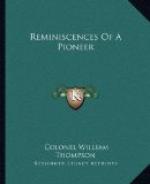While loading the wagon they happened to look towards the house, which was in plain view, and saw it in flames. They could also see the Indians around the house. Now the only means of escape was crossing the river, the way they had come. The mountains rose hundreds of feet perpendicularly at their backs, rendering escape impossible in that direction. Hastily cutting the harness from the horses they mounted, and Clark, who was a cool headed man in danger, and brave as a lion withal, told the boy to follow him. As they plunged into the ford they saw a number of Indians lined upon the opposite bank. But it was the only alternative, and the Indians thinking the two men were charging them, ran back out of sight. As they emerged from the river, which here was a shallow ripple, and started up the cut in the bank, the Indians discovered they were unarmed and attempted to close in on them. However, Clark and the boy had reached the top of the bank, and turning their horses up the river towards the mouth of Bridge Creek, sped for dear life.
As soon as they had passed beyond the reach of the bullets and arrows of the savages, Clark tried to persuade the boy to hold up and save his horse. The boy, however, was thoroughly frightened and drove his horse to the top of his speed. Clark, meanwhile, had looked back and saw the Indians mounting, and now began a race, on one side for life, on the other for scalps. The race was prolonged scarcely two miles when young Masterson’s horse began to fail. He was then a quarter of a mile ahead of Clark, who, nursing his horse, kept just beyond reach of the bullets. Gradually the gap between Clark and the boy narrowed, and slowly the Indians began to gain. At last Clark rode up beside the boy whose horse was thoroughly spent. He remained beside him until an Indian, riding a black horse, Clark said, ran up within twenty feet of him. The boy saw him raise his gun, and throwing himself from his horse with the exclamation, “O, Lord,” was lost to view in the dust. The Indian was at least fifty yards ahead of the others and did not stop to kill the boy, probably leaving him for those behind. Sure of Clark, he kept on, his black and savage heart leaping with joy in anticipation of torturing him.
After tolling the Indian some little distance and coming to a turn in the road, Clark let his horse out and did not slacken his speed until our camp was reached.
As may be well imagined, we did not spare our horses on the return, Clark having been provided with a fresh animal. But it was six or seven miles back to where Masterson left his horse. When we arrived there the search began. But failing to find the body, the awful possibility began to dawn upon us that he had been captured alive. Clark was wild. Had he found the dead body of the boy, it would have been nothing compared to the thought of his capture alive and death at the stake. A search now began for the trail of the Indians, as they had evidently left before our approach. But while this was going on, some of the men found the boy under a bank, shielded from sight by over-hanging earth and matted roots. When pulled out he was more dead than alive, his long bath in the water rendering him practically helpless.




